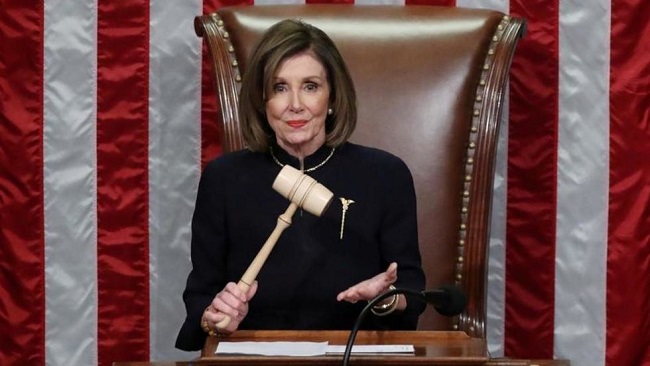US: Pelosi sets Wednesday vote on sending Trump impeachment charges to Senate
The Democratic-led US House of Representatives will vote on Wednesday to send formal impeachment charges against President Donald Trump to the Senate, House Speaker Nancy Pelosi has said, likely setting the start of Trump’s trial for later this week.
Pelosi met privately Tuesday at the Capitol with House Democrats about next steps, ending her blockade a month after they voted to impeach Trump on charges of abuse of power and obstruction of Congress.
The Speaker said the House will vote to transmit the charges and name the House managers for the case. She warned the Republican-led Senate off any idea of simply dismissing the case against Trump.
“The President and the Senators will be held accountable,” Pelosi said in a statement. “The American people deserve the truth, and the Constitution demands a trial.”
Trump became only the third US president to be impeached when the House last month approved charges that he abused his power by pressuring Ukraine to announce an investigation into his Democratic rival Joe Biden and obstructed Congress.
But Pelosi had delayed sending the charges to the Senate in an unsuccessful effort to get that chamber’s Republican Majority Leader Mitch McConnell to agree to include new witness testimony that could be damaging to the Republican president.
The Senate is expected to acquit Trump, as none of its 53 Republicans have voiced support for ousting him, a step that would require a two-thirds majority in the 100-member Senate.
A Wednesday vote would allow the Senate to start the trial on Thursday afternoon, although the first few days will be consumed with housekeeping duties such as swearing in members and formally reading the two impeachment charges.
Lawmakers likely would not hear opening arguments until next week at the earliest.
In a US presidential impeachment trial, the senators act as a jury in proceedings overseen by the head of the Supreme Court, Chief Justice John Roberts. Republicans and Democrats are likely to clash over the issue of whether to call new witnesses.
Trump has denied any wrongdoing and has dismissed his impeachment as a partisan bid to undo his 2016 election win as he tries to win re-election in November.
The White House said on Tuesday the trial was “purely political”.
“It’s out of a desire to gain more power. It has nothing to do with the rule of law by any stretch because the articles they came up with don’t actually cite any crime. It’s just to try and smear this president because they know they can’t beat him at the ballot box,” White House spokesman Hogan Gidley told Fox News.
Prosecution case
The case against Trump is focused on a July 25 telephone call in which he asked Ukrainian President Volodymyr Zelenskiy to open a corruption investigation into former Vice President Biden and his son Hunter, and into a discredited theory that Ukraine, not Russia, meddled in the 2016 US election.
Democrats say Trump abused his power by asking a foreign government to interfere in an American election for his own political benefit at the expense of US national security.
Joe Biden, whose son served on the board of a Ukrainian gas company, is a leading Democratic candidate for the presidential nomination to face Trump in the Nov. 3 election.
The two articles of impeachment – or formal charges – against Trump include an accusation that he obstructed Congress’ efforts to investigate him by instructing officials to ignore House committee subpoenas to testify or to produce documents at an earlier stage of the Ukraine investigation.
Democrats want to hear at the trial from current and former White House officials such as former national security adviser John Bolton for insight into Trump’s pressure campaign on Ukraine that could be damaging for the president’s defence.
But the Republican majority in the Senate will set the trial’s rules and McConnell has not committed to allowing any witnesses or new documents. He instead could steer the process towards a quick acquittal.
Pelosi could name up to 10 lawmakers as managers to argue the case against Trump, including House Intelligence Committee Chairman Adam Schiff, who spearheaded the impeachment probe, and House Judiciary Committee Chairman Jerrold Nadler.
The 1999 impeachment trial of then-President Bill Clinton lasted five weeks. If the Senate conducts its trial along those lines, as Republican McConnell has suggested, that would mean lawmakers would still be considering charges against the president while the first nominating contests of the 2020 presidential election were underway in Iowa and New Hampshire.
That could make life difficult for the four senators who are running for the Democratic nomination: Elizabeth Warren, Michael Bennet, Amy Klobuchar and Bernie Sanders.
No US president has been removed as a direct result of impeachment. Richard Nixon resigned in 1974 before he could be removed, while Andrew Johnson and Bill Clinton were impeached by the House, respectively in 1868 and 1998, but not convicted by the Senate.
Source: France 24 and Reuters





